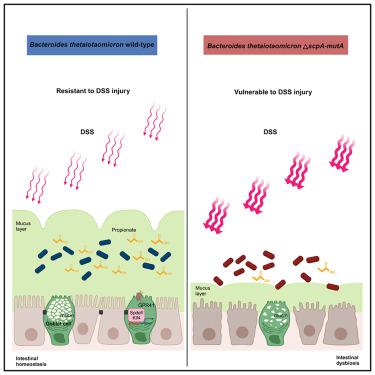Cell Host & Microbe ( IF 30.3 ) Pub Date : 2023-12-05 , DOI: 10.1016/j.chom.2023.11.005 Xingyu Wang , Zhongle Cai , Qiaoling Wang , Chao Wu , Yingkai Sun , Zhifeng Wang , Xiaoqiang Xu , Wenzhi Xue , Zhiwen Cao , Minchun Zhang , Yinmeng Zhu , Huibin Lin , Yi Zhang , Mingyang Yuan , Yuxiao Zhao , Aibo Gao , Yuqiang Yu , Yufang Bi , Guang Ning , Weiqing Wang , Jiqiu Wang , Ruixin Liu

|
Propionate is a short-chain fatty acid that is generated upon microbiome-mediated fiber fermentation in the intestine. By modulating immune and metabolic pathways, propionate exerts many health benefits. Key bacterial species, such as Bacteroides thetaiotaomicron, generate propionate, but the biochemical pathways and specific functions remain undetermined. We identified a gene operon-encoding methylmalonyl-CoA mutase (MCM) that contributes to propionate biosynthesis in B. thetaiotaomicron. Colonization of germ-free mice with wild-type or MCM-deficient strains as well as in vitro examination demonstrated that MCM-mediated propionate production promotes goblet cell differentiation and mucus-related gene expression. Intestinal organoids lacking the propionate receptor, GPR41, showed reduced goblet cell differentiation upon MCM-mediated propionate production. Furthermore, although wild-type B. thetaiotaomicron alleviated DSS-induced intestinal inflammation, this effect was abolished in mice receiving the MCM-deficient strain but restored upon propionate supplementation. These data emphasize the critical role of MCM-mediated propionate biosynthesis in goblet cell differentiation, offering potential pathways to ameliorate colitis.
中文翻译:

拟杆菌甲基丙二酰辅酶A变位酶产生丙酸,促进肠道杯状细胞分化和稳态
丙酸是一种短链脂肪酸,是在肠道微生物介导的纤维发酵过程中产生的。通过调节免疫和代谢途径,丙酸盐具有许多健康益处。关键细菌种类,例如多形拟杆菌,会产生丙酸盐,但其生化途径和具体功能仍未确定。我们鉴定了一种编码甲基丙二酸单酰辅酶A变位酶(MCM)的基因,该基因有助于B.thetaiotaomicron中的丙酸生物合成。野生型或 MCM 缺陷菌株对无菌小鼠的定植以及体外检查表明,MCM 介导的丙酸产生可促进杯状细胞分化和粘液相关基因表达。缺乏丙酸受体 GPR41 的肠类器官在 MCM 介导的丙酸产生时表现出杯状细胞分化减少。此外,虽然野生型B. thetaiotaomicron减轻了 DSS 诱导的肠道炎症,但这种作用在接受 MCM 缺陷菌株的小鼠中被消除,但在补充丙酸后恢复。这些数据强调了 MCM 介导的丙酸生物合成在杯状细胞分化中的关键作用,为改善结肠炎提供了潜在途径。



























 京公网安备 11010802027423号
京公网安备 11010802027423号